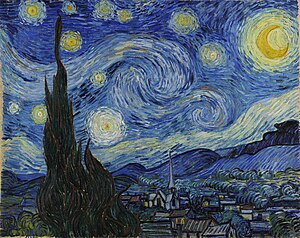Psychotic episode
| Psychosis | |
|---|---|
 |
|
| Van Gogh's The Starry Night, from 1889, shows changes in light and color as can appear with psychosis. | |
| Classification and external resources | |
| Specialty | Psychiatry |
| ICD-10 | F20-F29 |
| ICD-9-CM | 290-299 |
| OMIM | 603342 608923 603175 192430 |
| MedlinePlus | 001553 |
| MeSH | F03.700.675 |
Psychosis is an abnormal condition of the mind that involves a "loss of contact with reality". People experiencing psychosis may exhibit personality changes and thought disorder. Depending on its severity, this may be accompanied by unusual or bizarre behavior, as well as difficulty with social interaction and impairment in carrying out daily life activities.
Psychosis as a sign of a psychiatric disorder is a diagnosis of exclusion. That is, a new-onset episode of psychosis is not considered a symptom of a psychiatric disorder until other relevant and known causes of psychosis are properly excluded. Medical and biological laboratory tests should exclude central nervous system diseases and injuries, diseases and injuries of other organs, psychoactive substances, and toxins as causes of symptoms of psychosis before any psychiatric illness can be diagnosed. In medical training, psychosis as a sign of illness is often compared to fever since both can have multiple causes that are not readily apparent.
The term "psychosis" is very broad and can mean anything from relatively normal aberrant experiences through to the complex and catatonic expressions of schizophrenia and bipolar type 1 disorder. In properly diagnosed psychiatric disorders (where other causes have been excluded by extensive medical and biological laboratory tests), psychosis is a descriptive term for the hallucinations, delusions and impaired insight that may occur. Psychosis is generally the term given to noticeable deficits in normal behavior (negative signs) and more commonly to diverse types of hallucinations or delusional beliefs, particularly with regard to the relation between self and others as in grandiosity and pronoia or paranoia.
...
Wikipedia
